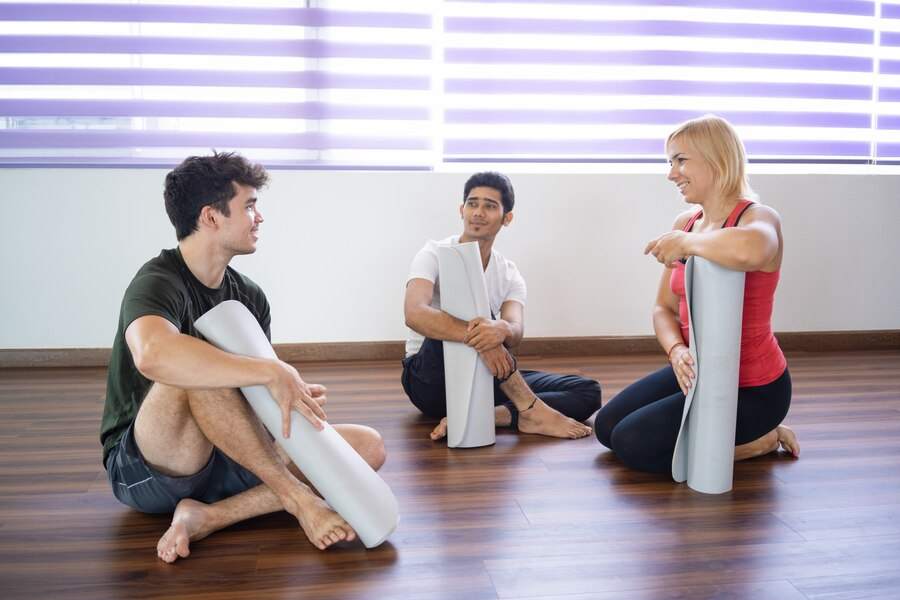Table of Contents
Yoga therapy has emerged as a profound healing modality, blending ancient wisdom with modern science to address physical, mental, and emotional well-being. As interest in holistic health continues to rise, the demand for qualified yoga therapists has surged. However, with the plethora of yoga therapy courses available, it can be overwhelming to determine which program aligns best with your aspirations and needs. In this comprehensive guide, we’ll explore the key factors to consider when selecting the right yoga therapy course for you.
Understanding Yoga Therapy
Yoga therapy transcends the traditional practice of yoga as physical exercise. It encompasses a holistic approach to healing, integrating various yogic techniques such as asana (postures), pranayama (breathwork), meditation, and mindfulness to address specific health concerns. Unlike a generic yoga class, yoga therapy sessions are tailored to individual needs, making it an effective tool for managing conditions ranging from chronic pain and stress to anxiety and depression.
Factors to Consider When Choosing a Yoga Therapy Course
- Accreditation and Certification
First and foremost, ensure that the yoga therapy course you’re considering is accredited by a reputable organization. Accreditation ensures that the program meets certain standards of quality and adherence to ethical guidelines. Look for certifications recognized by governing bodies such as the International Association of Yoga Therapists (IAYT) or the Yoga Alliance. Graduating from an accredited program not only validates your training but also enhances your credibility as a yoga therapist.
- Curriculum and Focus Areas
Evaluate the curriculum of the yoga therapy course to ensure it covers the essential components of yoga therapy practice. Look for courses that offer a comprehensive study of anatomy and physiology, psychology, therapeutic techniques, and the philosophy of yoga. Consider your specific interests and the areas of yoga therapy you wish to specialize in, whether it’s trauma-informed yoga, chronic pain management, or prenatal yoga therapy. Choose a program that aligns with your goals and aspirations as a future yoga therapist.
- Teaching Faculty and Expertise
The expertise and experience of the teaching faculty play a crucial role in the quality of education you’ll receive. Research the background of the instructors, including their credentials, years of experience in yoga therapy, and any specialized training they may have. Ideally, the faculty should comprise experienced yoga therapists, healthcare professionals, and experts in related fields such as psychology and nutrition. Look for programs where faculty members are actively involved in the yoga therapy community and contribute to the advancement of the field through research and publications.
- Teaching Methodology and Practical Experience
A good yoga therapy course should provide a balance between theoretical knowledge and practical experience. In addition to classroom instruction, look for programs that offer hands-on training, supervised practicum, and opportunities for real-world application of yoga therapy principles. Practical experience is essential for developing the skills and confidence needed to work with clients effectively. Consider whether the course includes supervised internships or practicum hours, which can provide valuable experience and mentorship under the guidance of experienced yoga therapists.
- Student Support and Resources
Evaluate the level of support and resources provided to students throughout the duration of the course. This includes access to study materials, online resources, library facilities, and support services such as academic advising and career counseling. Consider the availability of mentoring programs or peer support groups where students can connect with fellow trainees and alumni. A supportive learning environment can greatly enhance your educational experience and facilitate your growth as a yoga therapist.
- Cost and Accessibility
Cost is an important consideration when choosing a yoga therapy course, but it shouldn’t be the sole determining factor. Compare the tuition fees of different programs and consider the overall value in terms of the quality of education, accreditation, and opportunities for professional development. Take into account additional expenses such as textbooks, materials, travel, and accommodation if the course requires onsite attendance. Additionally, consider the accessibility of the program in terms of location, scheduling options, and flexibility for working professionals or those with other commitments.
- Alumni Success and Reputation
Research the reputation of the yoga therapy program and its track record of alumni success. Look for testimonials, reviews, and success stories from former students to gauge the effectiveness of the training and its impact on their careers. Alumni networks can also provide valuable insights and opportunities for networking, mentorship, and professional development. Consider reaching out to alumni or attending informational sessions or open houses to learn more about their experiences and perspectives on the program.
Conclusion
Choosing the right yoga therapy course is a significant decision that can shape your career and impact the lives of others. By considering factors such as accreditation, curriculum, teaching faculty, practical experience, student support, cost, accessibility, and reputation, you can make an informed choice that aligns with your goals and aspirations as a future yoga therapist. Remember that the journey of becoming a yoga therapist is not just about acquiring knowledge and skills but also about personal growth, self-discovery, and a deepening connection to the healing power of yoga. Choose a program that resonates with your heart and soul, and embark on a transformative journey to becoming a beacon of healing and compassion in the world.
